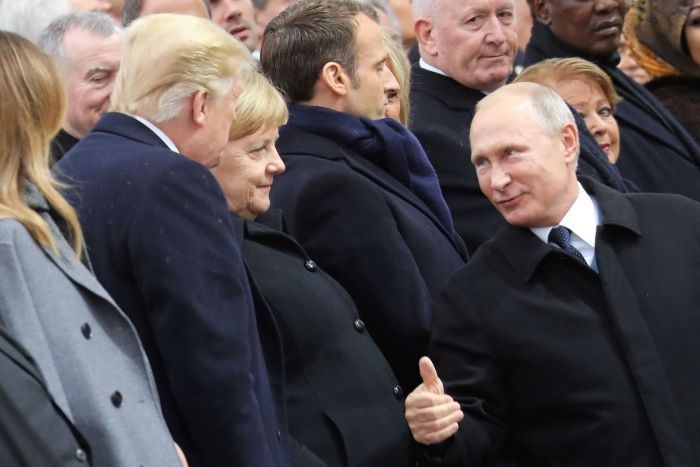Nationalism, a betrayal of Patriotism: Macron
November 12, 2018 | Expert Insights

At the centenary of the end of World War 1 in Paris, French President Emmanuel Macron encouraged world leaders to reject ‘Nationalism’.
Background
Armistice day is commemorated every year on the 11th of November to mark the armistice signed between the Allies of World War I and Germany at Compiegne, France, which took effect at the eleventh hour of the eleventh day of the eleventh month of 1918. The armistice initially expired after a period of 36 days. A formal peace was however reached only when the Treaty of Versailles was signed in 1919.
9.7 million soldiers and 10 million civilians died in World War I, from 1914 to 1918.
The Armistice Day ceremony, held at the Arc de Triomphe, honours the nearly 10 million soldiers killed during the war.

Analysis
The French president, Emmanuel Macron, has warned of the dangers of rising nationalism as he addressed Donald Trump, Vladimir Putin and other world leaders at a ceremony in Paris to mark the 100th anniversary of the first world war armistice.
Describing himself as a patriot, Macron said: “Patriotism is the exact opposite of nationalism. Nationalism is a betrayal of patriotism. In saying ‘our interests first, whatever happens to the others,’ you erase the most precious thing a nation can have, that which makes it live, that which causes it to be great and that which is most important: its moral values”.
Mr. Macron and dignitaries walked to the Tomb of the Unknown Soldier, a memorial to France's fallen under the Arc de Triomphe, in the rain under black umbrellas as church bells tolled through the city. In a speech lasting nearly 20 minutes, the French leader called on fellow leaders to "fight for peace".
"Ruining this hope with a fascination for withdrawal, violence or domination would be a mistake for which future generations would rightly find us responsible," he said. He denounced fringe ideologies that have become more mainstream, warping religious beliefs and setting loose extremist forces on a “sinister course once again that could undermine the legacy of peace, we thought we had forever sealed.”
The service ended with the bugle call that was played at 11:00 on 11 November 1918 to signal the end of hostilities. Several world leaders also held bilateral meetings at the events. Mr. Putin told journalists he had a brief conversation with Mr. Trump and that it went well.
However, the French organisers of the lunch event changed the lunchtime seating arrangement at the last minute so Mr. Trump and Mr. Putin would not be sitting next to each other, Russian media reported.
Mr. Macron and German Chancellor Angela Merkel subsequently attended a peace conference - the Paris Peace Forum - with leaders including Mr. Putin and Turkey's Recep Tayyip Erdogan. Mrs. Merkel warned that "blinkered" nationalism was gaining ground in Europe and elsewhere. Mr. Macron and Mrs. Merkel also visited the town of Compiègne, north of Paris. They signed a book of remembrance in a railway carriage identical to the one in which the 1918 Armistice was sealed.
Mr. Trump did not attend the peace conference and left for the US shortly after it began.
Earlier he visited a cemetery in Suresnes in western Paris, saying he had gone there "to pay tribute to brave Americans" who died in the war. He caused controversy by cancelling a trip to another cemetery for the war dead because of bad weather.
During his speech in Canberra, Australian Prime Minister Scott Morrison spoke of the importance of remembrance, saying people need "to learn from the past so that we can better navigate the changing currents of our own times". In India, memorials were held for the 74,000 troops who died fighting on the other side of the world.
"This was a war in which India was not directly involved, yet our soldiers fought world-over, just for the cause of peace," Prime Minister Narendra Modi.
Assessment
Our assessment is that Macron’s clarion call to reject ‘nationalism’ and his innuendo that nationalism is nothing but a betrayal of patriotism, clearly emphasizes the perils of exclusion and the need to work together to maintain peace and avoid the spiral of war. We feel that Macron’s remarks were a rebuke of Trump, who has proudly espoused an "America First" foreign policy.








Comments